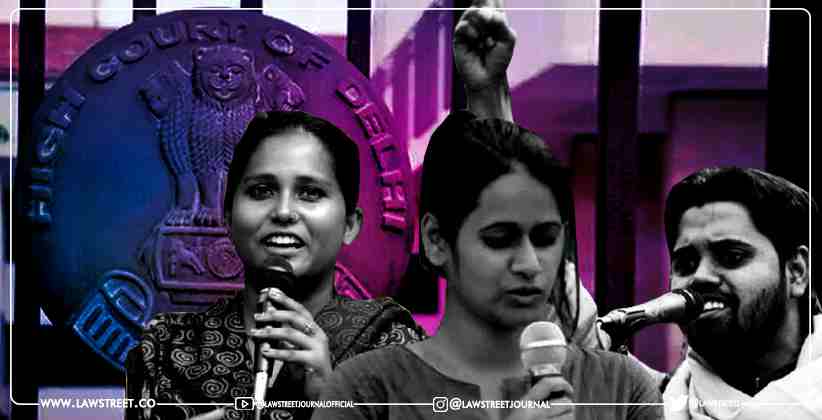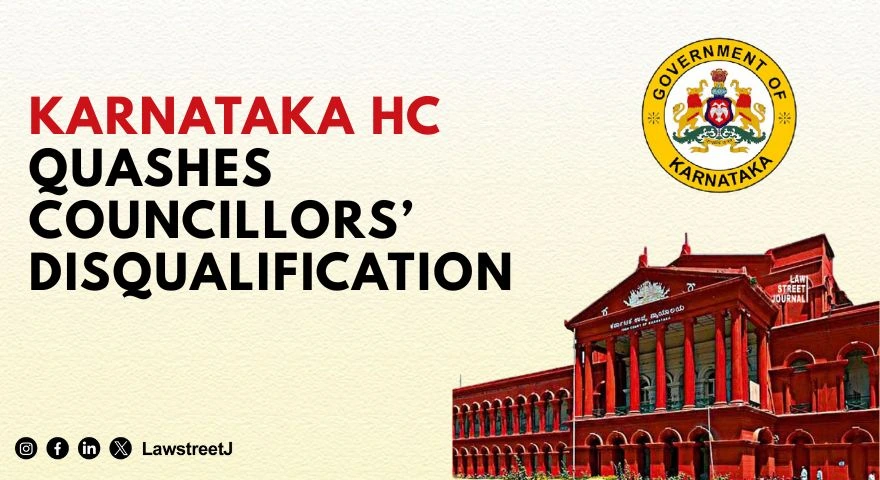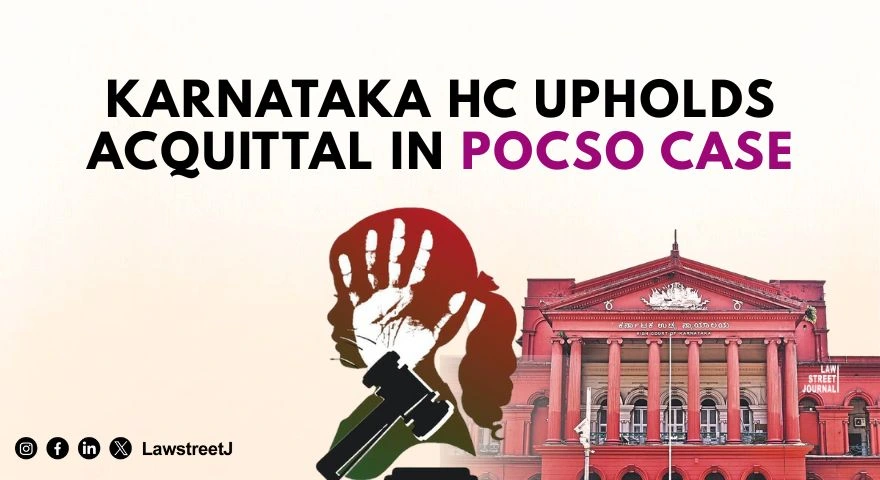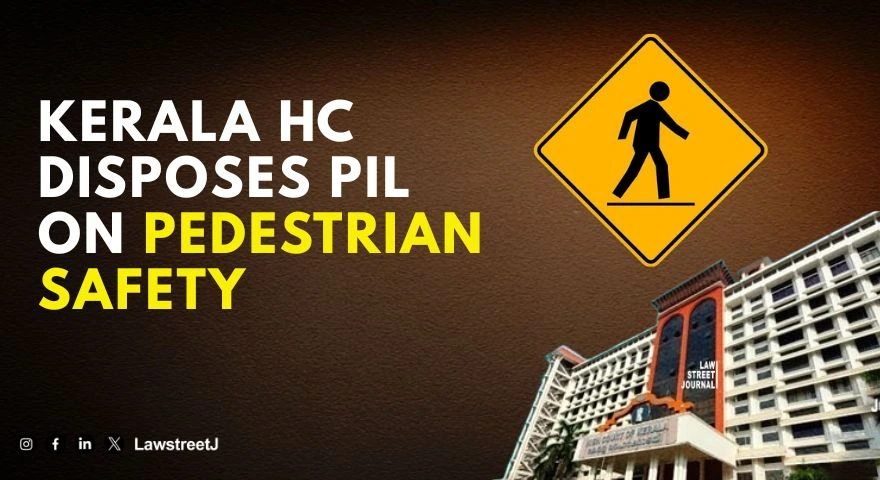The Delhi High Court on Tuesday (June 15, 2021) granted bail to Jawaharlal Nehru University students Devangana Kalita, Natasha Narwal, and Asif Iqbal Tanha who were arrested under the Unlawful Activities (Prevention) Act (UAPA) in connection with the northeast Delhi riots in 2020.
The Court held that the charge sheet lacked any specific, particularized, factual allegation and that prima facie no offense under Section 15, 17, and 18 of the UAPA has been made out based on the material on record in the three cases.
There is absolutely nothing in the subject charge-sheet, by way of any specific or particularized allegation, that would show the possible commission of a terrorist act within the meaning of section 15 UAPA; or an act of raising funds to commit a terrorist act under section 17; or an act of conspiracy to commit or an act preparatory to commit, a terrorist act within the meaning of section 18 UAPA. Accordingly, prima-facie we are unable to discern in the subject charge-sheet the elemental factual ingredients that are a must to found any of the offenses defined under section 15, 17, or 18 UAPA.
We find ourselves unpersuaded and unconvinced with this submission since we find it is not founded on any specific factual allegation and we are of the view that the mere use of alarming and hyperbolic verbiage in the subject charge-sheet will not convince us otherwise. In fact, upon closer scrutiny of the submissions made on behalf of the State, we find that the submissions are based upon inferences drawn by the prosecuting agency and not upon factual allegations, the order read.
In its order, the court rebuked the Delhi Police for casually invoking provisions of the anti-terror law against the three accused, who had protested the enactment of the Citizenship Amendment Act (CAA), noting that the line between the constitutionally guaranteed right to protest and terrorist activity has been blurred.
We are constrained to say, that it appears, that in its anxiety to suppress dissent and in the morbid fear that matters may get out of hand, the state has blurred the line between the constitutionally guaranteed right to protest and terrorist activity, a Bench of Justice Siddharth Mridul and Justice Anup Jairam Bhambhani observed.
If such blurring gains traction, democracy would be in peril, the Bench asserted.
Foisting grave penal provisions engrafted in sections 15, 17, and 18 UAPA frivolously upon people, would undermine the intent and purpose of the Parliament in enacting a law that is meant to address threats to the very existence of our Nation, the Court added.
Terming as somewhat vague, the definition of the term terrorist act under the stringent UAPA laws and warning against its use in a cavalier manner, the High Court set aside the trial court orders denying bail to the three accused, allowing their appeals, and admitting them to regular bail.
The Court then observed that activities such as inflammatory speeches, chakka jams, instigation of women protestors, etc. which the accused persons are alleged to have been party to may be considered as crossing the lines of peaceful protests permissible under our constitutional guarantee however, they would not amount to commission of a terrorist act or a conspiracy or an act preparatory to the commission of a terrorist act as understood under the UAPA.
The right to protest is a fundamental right that flows from the constitutionally guaranteed right to assemble peaceably and without arms enshrined in Article 19(1)(b) of our Constitution, surely the right to protest is not outlawed and cannot be termed as a terrorist act within the meaning of the UAPA, the Court observed.
The State contended that acts that are likely to strike terror also come within the ambit of Section 15 of UAPA. Even the likelihood that the accuseds acts or omissions may threaten the nation is an offense under Section 15 and 18 of the Act.
To which the Court replied, We are of the view that the foundations of our nation stand on surer footing than to be likely to be shaken by a protest, however vicious, organized by a tribe of college students or other persons, operating as a coordination committee from the confines of a University situate in the heart of Delhi.
Narwal, who is a student pursuing an MPhil-PhD program at the Centre of Womens Historical Studies at Jawaharlal Nehru University, and Decangana Kalita, who is pursuing an MPhil-PhD program in the Department of Womens studies at JNU, were taken into police custody on May 29, 2020.
Narwal and Kalita were arrested for allegedly being a part of a premeditated conspiracy behind the communal violence that broke out in northeast Delhi in February that year during protests against the Citizen (Amendment) Act (CAA).
Asif Iqbal Tanha, a 25-year-old student, pursuing his final year of BA (Hons.) Persian program at the Jamia Milia Islamia University was arrested in the same UAPA case on May 19 last year which was being probed by the Special Cell of the Delhi Police.
At the time of his arrest in the case, Tanha was already in judicial custody in a different case registered in December 2019, at Jamia Nagar Police Station in connection with protests held in Delhi in 2019 against the CAA and NRC.
The three activists who were arrested in May last year have been named in multiple FIRs in relation to the riots. They were granted bail by local courts in the other riots-related cases but denied bail in the FIR where the stringent UAPA provisions were invoked against them.
While granting bail the Court directed the three Prinjra Tod activists to surrender their passports and to not indulge in any unlawful activities and reside at the address as mentioned in records.
Student activists and bodies welcomed the Delhi High Court order.
Reacting to the Court order, Safoora Zargar, a Jamia Millia Islamia scholar and co-accused in the UAPA case said, it was one of the happiest days of her life.
Bail to Devangana, Natasha & Asif in UAPA case. One of the happiest days of my life. Let more follow. Let justice prevail. Alhamdulillah., she tweeted.
However, the Delhi Police is not satisfied with the order is likely to file an appeal in the Supreme Court against the Delhi High Court Order.
We are not satisfied with the interpretation of the provisions of the Unlawful Activities (Prevention) Act by the Honble High Court. We are proceeding with the filing of a Special Leave Petition before the Honble Supreme Court of India., a Delhi Police spokesperson said.








